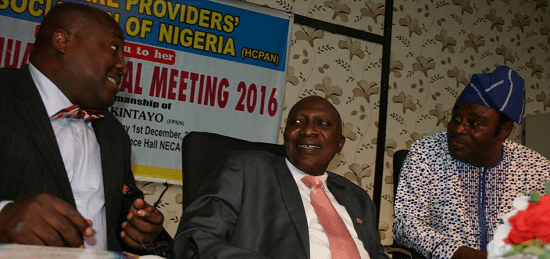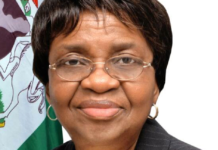…As HCPAN holds 12th Annual AGM/Scientific Conference
In line with the World Health Organisation (WHO)’s recommendation that every country allocates at least 15 per cent of its annual budget to healthcare, as well as making health insurance compulsory for all its citizens, some experts in the health sector have described the 3.6 per cent allocation to healthcare in the last national budget as not just ridiculously low but totally unacceptable.
The disclosure was one of the submissions made at the 12th Annual General Meeting and Scientific Conference of the Healthcare Providers’ Association of Nigeria (HCPAN) held recently at NECA House, Ikeja, Lagos.
Speaking at the event, Dr (Chief) Adeyeye Jimi Arigbabuwo, former national vice president of HCPAN, decried the way federal government’s handling of health sector in 2016, stressing that if care is not taken, the presently ailing sector may eventually collapse.

“Our health sector is struggling. What we are trying to do is to make sure we call for rescue, and in calling for rescue, all of us must form the rescue team and we must learn to tell each other the truth,” he said.
He further emphasised the need for immediate implementation of the National Health Act, which according to him, had been left unimplemented since 2014.
In his words: “I want to tell you that by not implementing that law, every health facility you see around today is illegal because the law states that after two years (and that was since 2014), if certain things are not met, it is as good as if we are operating an illegal healthcare delivery system. So the number one thing to do now is to implement the Act.”
He added that government needs to urgently address the issue of scarcity of healthcare workers and maldistribution of the few available ones.
According to him, out of the estimated 40,000 doctors that the country currently has, more than 70 per cent of them are serving in urban areas, leaving the remaining 30 per cent to serve the rural population which he said constitute the bulk of the population.
“So, apart from scarcity, we have to look at human resource in the health sector and ensure that there is proper distribution,” Arigbabuwo said.
Speaking in the same vein, Dr Umar Oluwole Sanda, HCPAN president, stated that the healthcare sector did poorly in 2016, as the budget allocated to it was clearly inadequate, adding that the federal government must increase its budgetary allocation to the sector so that it doesn’t end worse in 2017.
“There is need for government to show more interest in health insurance, as many Nigerians cannot afford the bills of hospitals,” Sanda said. “In most healthcare facilities in the country, it is quite difficult to access healthcare services because of the cost; so it is important that the government invest in the future of health insurance, especially in a recession period like this.”
Speaking further, Dr Sanda noted that one of the challenges facing the association is the issue of capitation being paid to health workers by the National Health Insurance Scheme (NHIS), stressing that the money is too meagre to meet the needs of the workers.
He also stated that the best way to ensure quality health care delivery for Nigerians at all times is to encourage them to invest in health insurance as they wouldn’t need to pay out-of-pocket.
“Since many citizens find it difficult to even purchase simple malaria drugs and pay their hospital bills especially with the increased price of majority of health products due to the ongoing recession, HCPAN, a private elementary association of various health professionals including medical doctors, nurses, pharmacists and laboratory scientists, has decided to partner with the government and the public sector to relieve Nigerians of financial burden while receiving quality health treatment,” Sanda said.
In their own submissions, the duo of Dr (Mrs) Adenike Olaniba, a public health consultant and immediate past president, HCPAN; and Dr Kalada Richard, registrar and chief executive officer of Institute for Healthcare Financial Management, disclosed that health insurance in Nigeria has had very little impact since its debut in 2005, as it has only been able to capture about five percent of the population.
According to Olaniba, until the NHIS is able to capture the remaining 95 per cent of the population who are yet to be covered by the scheme, the impact of the scheme will continue to remain limited.
Other dignitaries at the event were Pharm. Olumide Akintayo, immediate past president, Pharmaceutical Society of Nigeria (PSN), who was the chairman of the event; Dr Kalada Richard, keynote speaker; Pharm. Madehin Gafar, chairman, Organising Committee and national secretary, HCPAN; Pharm. Anthony Oyawole, vice-president, pharmacy, HCPAN; Dr Priscilia Imade; and Mr Igwe Akujobi, among others.










